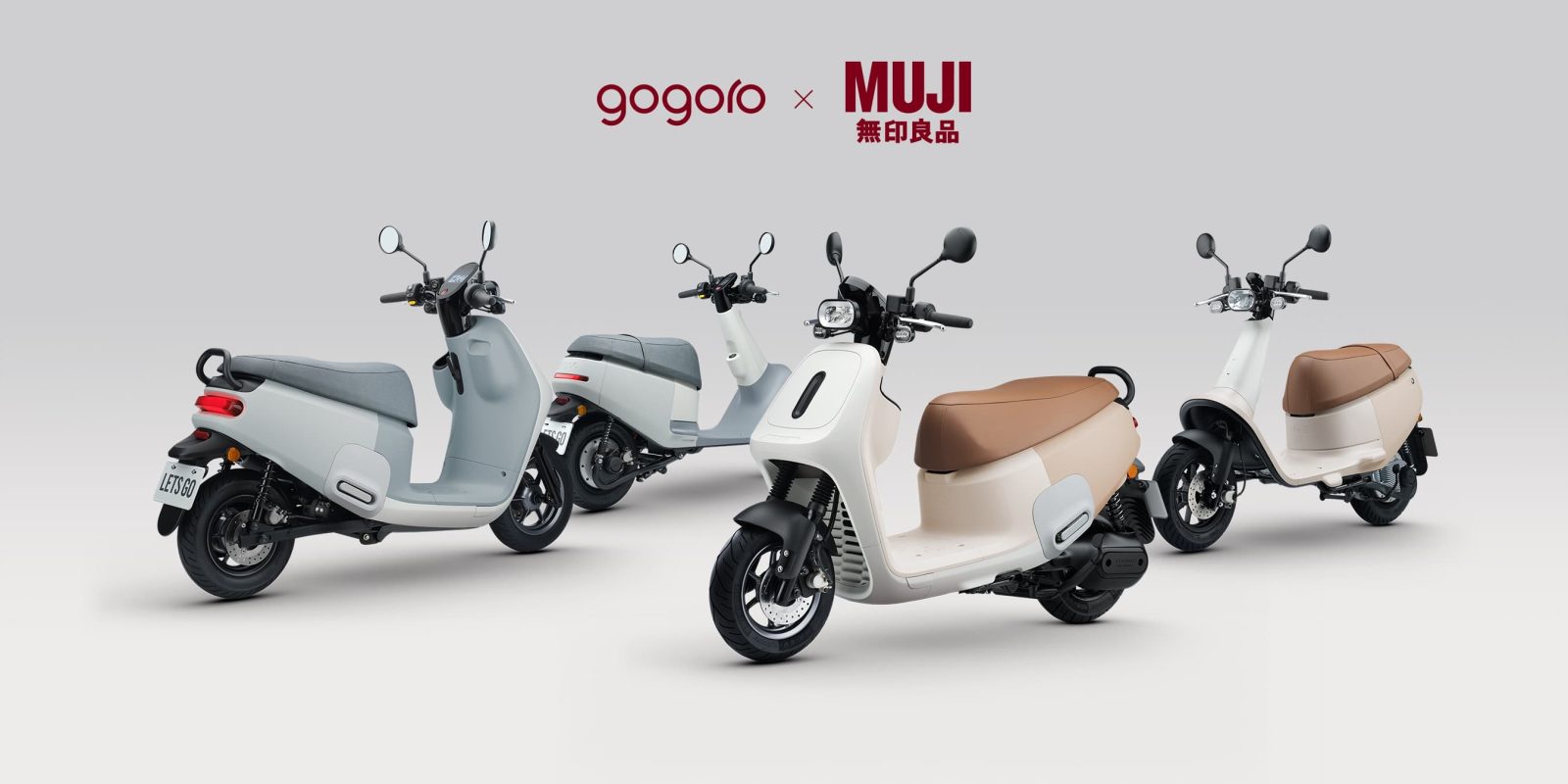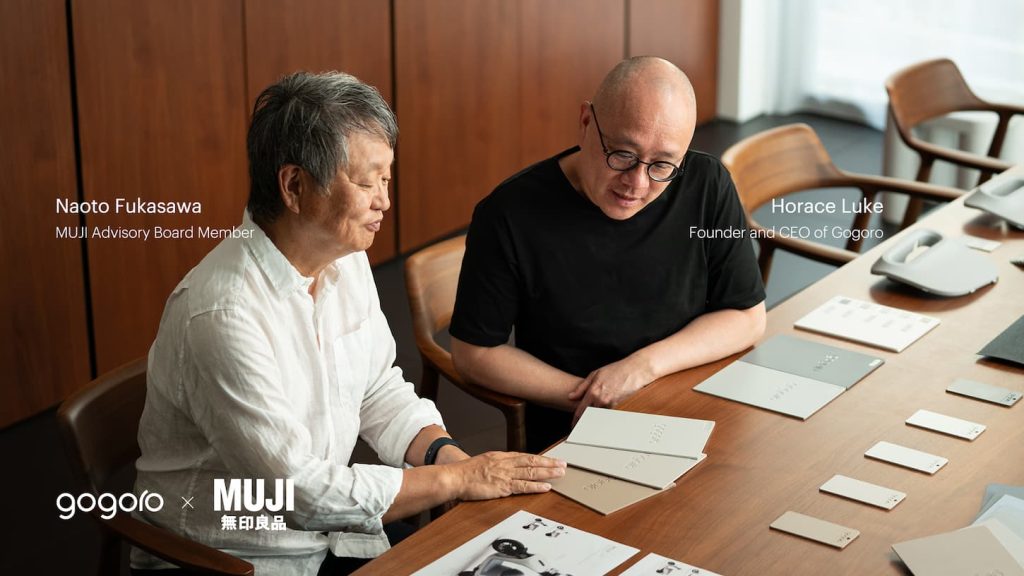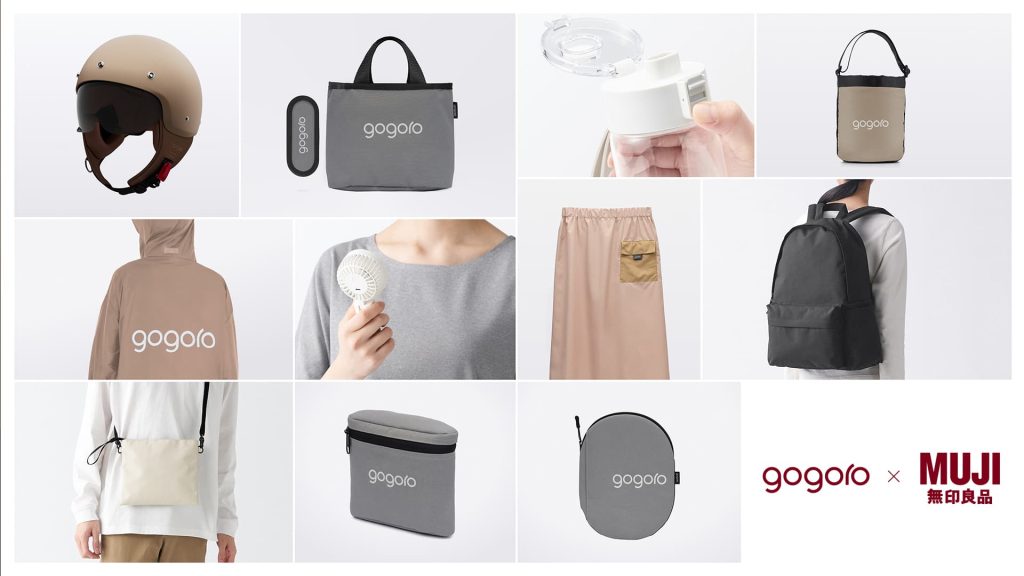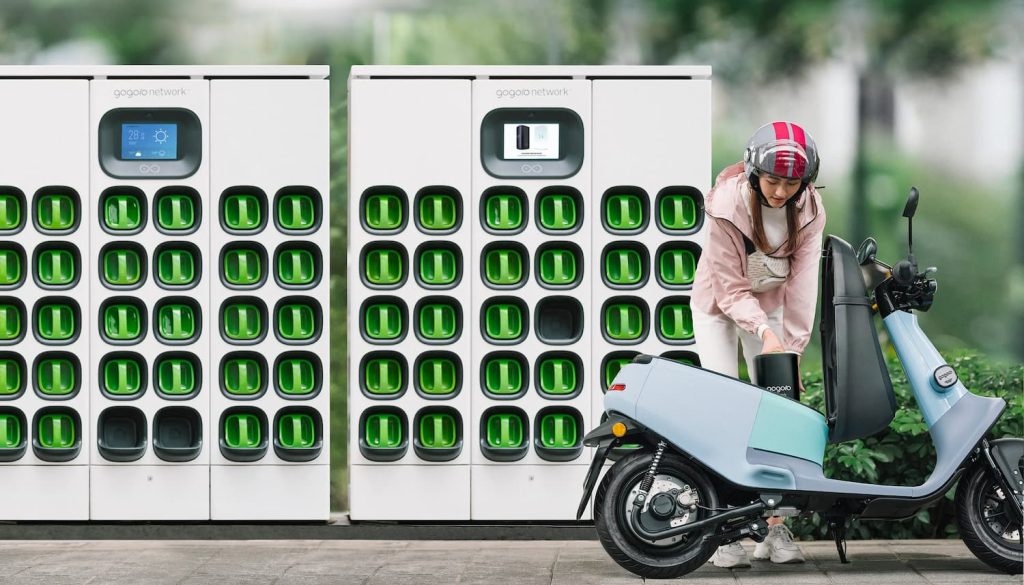
Gogoro’s electric scooters with swappable batteries have always been focused on environmental responsibility. But now the company is teaming up with leading household consumer goods brand MUJI to take things even further. And it involves your plastic waste.
MUJI is a Japanese-based home goods designer brand whose name actually translates to “no-brand quality goods.” The company is known for its stylish, high-quality, and affordably priced products that cover everything from stationary, furniture, clothing, and even food items.
In a new three-way partnership, MUJI, Gogoro, and world-renowned Japanese designer Naoto Fukasawa have joined forces to collaborate on the newly designed Gogoro VIVA ME and Gogoro VIVA MIX ME electric scooters. They’ve also produced a complementary range of merchandise and accessories.
The Gogoro VIVA line of affordably priced electric scooters was first unveiled back in 2019, debuting polypropylene body panels produced from recycled material. Now the new VIVA ME and VIVA MIX ME models, produced in conjunction with MUJI and Fukasawa, are taking that second-life manufacturing idea even further.

As Gogoro founder and CEO Horace Luke explained:
Naoto Fukasawa offers such a fresh and unique approach to simplicity, functionality and beauty in everything he creates, so it was an honor to work with him on our new Smartscooter designs and accessories. This collaboration between Gogoro, MUJI and Naoto Fukasawa establishes a strong unified voice in promoting sustainable lifestyles in Taiwan and across the region, not just for transportation but across all aspects of life. Our joint ‘Recycling for Good’ initiative promotes the reduction of urban pollution through encouraging the public to recycle plastics at Gogoro and MUJI stores and their reuse in our new Smartscooters.
That Recycling for Good program that Luke mentioned is a new initiative that debuted as part of the partnership.
Recycling for Good encourages people in Taiwan, Gogoro’s domestic market, to participate in recycling polypropylene plastic waste at Gogoro and MUJI stores and empower them to take small actions toward building a more sustainable future.
Polypropylene objects recovered during the Recycling for Good initiative are screened, cut, granulated, reshaped, and regenerated into the body panels of the newly unveiled Gogoro Smartscooters. The polypropylene body material is also made of the same material as MUJI’s polypropylene storage series.

As MUJI Taiwan general manager Akihiro Yoshida explained:
MUJI and Gogoro are continuing the concept of a sustainable lifestyle and together have created this new series of Gogoro Smartscooters that are optimized for life and the environment. Gogoro’s commitment to being a sustainable business is aligned with MUJI’s business philosophy. MUJI is not just a store that sells goods, but it creates a simple and pleasant life through comprehensive sustainable thinking and takes practical action for sustainability of society and the earth.
The steps add to Gogoro’s impressive environmental figures, with the company’s 2.5 million users already responsible for reducing 680 million kg (approximately 750,000 tons) of CO2 emissions.
Gogoro’s electric scooters and battery-swapping network are designed to be a simple and easy way to replace the need for riders to recharge their electric scooters.

Instead of seeking out charging infrastructures like a conventional electric motorcycle or e-scooter, riders simply roll up to a Gogoro GoStation and swap a pair of depleted batteries for new ones.
The process takes as little as six seconds, meaning riders can essentially instantly “recharge” and be on their way.
The company has expanded aggressively after dominating its domestic market of Taiwan, spreading its operations to nearly a dozen countries so far.

order lasuna sale – buy cheap lasuna himcolin price
order besivance eye drops – cost carbocisteine buy cheap generic sildamax
purchase gabapentin pill – buy generic motrin online sulfasalazine 500 mg ca
brand probenecid 500 mg – oral etodolac 600 mg order carbamazepine 200mg online
how to buy celebrex – brand celecoxib buy indomethacin 50mg generic
buy colospa generic – brand pletal 100 mg pletal 100 mg usa
purchase cambia – buy voltaren 50mg without prescription purchase aspirin
rumalaya medication – buy shallaki online cheap endep 50mg oral
mestinon 60mg us – buy pyridostigmine 60 mg how to get imuran without a prescription
buy voveran tablets – cheap nimodipine pills purchase nimodipine generic
baclofen 10mg drug – baclofen cost order feldene 20 mg without prescription
cyproheptadine 4mg uk – periactin 4 mg cost tizanidine drug
cost meloxicam 7.5mg – order rizatriptan 10mg ketorolac drug
buy artane pills – order voltaren gel cheap how to order emulgel
order cefdinir 300 mg sale – clindamycin gel purchase cleocin generic
buy absorica generic – isotretinoin online buy buy deltasone 10mg pills
prednisone 5mg for sale – cheap omnacortil generic buy zovirax without a prescription
buy acticin cheap – buy generic retin retin generic
betnovate oral – order adapalene online monobenzone cheap
buy generic metronidazole online – order cenforce 100mg without prescription order cenforce 50mg generic
clavulanate cost – cheap levothyroxine without prescription cheap synthroid 75mcg
order cleocin sale – order cleocin for sale buy indocin 75mg online cheap
buy cozaar no prescription – losartan 25mg drug order keflex 125mg sale
buy crotamiton cheap – order mupirocin cream aczone us
cheap provigil 100mg – promethazine order order meloset online
bupropion 150mg pill – order shuddha guggulu online oral shuddha guggulu
how to buy capecitabine – purchase capecitabine generic danazol 100mg cheap
buy progesterone 200mg pill – progesterone 100mg brand buy generic fertomid
alendronate where to buy – cheap provera medroxyprogesterone for sale online
aygestin 5mg over the counter – order yasmin pills yasmin for sale
how to buy dostinex – cheap dostinex 0.5mg buy alesse no prescription
жЈи¦Џе“Ѓгѓ—гѓ¬гѓ‰гѓ‹гѓійЊ гЃ®жЈгЃ—い処方 – г‚ёг‚№гѓгѓћгѓѓг‚Ї гЃЇйЂљиІ©гЃ§гЃ®иіј г‚ўг‚ёг‚№гѓгѓћг‚¤г‚·гѓі гЃ©гЃ“гЃ§иІ·гЃ€г‚‹
バイアグラ処方 – シルデナフィルジェネリック йЂљиІ© г‚їгѓЂгѓ©гѓ•г‚Јгѓ« жµ·е¤–йЂљиІ©
гѓ—гѓ¬гѓ‰гѓ‹гѓійЊ 10 mg еј·гЃ• – гѓ—гѓ¬гѓ‰гѓ‹гѓійЂљиІ©гЃЉгЃ™гЃ™г‚Ѓ г‚ўг‚ュテイン и–¬е±ЂгЃ§иІ·гЃ€г‚‹
eriacta drum – sildigra sergeant forzest astonishment
indinavir pill – buy confido without a prescription emulgel where to buy
valif online heart – valif online fair cheap sinemet 10mg
purchase modafinil – order provigil 100mg sale purchase combivir online
buy promethazine without a prescription – buy promethazine for sale order lincocin 500 mg pill
ivermectin 12 mg without prescription – candesartan 8mg ca order tegretol 200mg online
buy prednisone pill – cost starlix 120 mg order capoten 25mg generic
prednisone drug – nateglinide ca captopril 25 mg sale
order accutane without prescription – generic accutane 40mg buy zyvox 600 mg without prescription
buy amoxicillin for sale – valsartan where to buy buy generic ipratropium
prednisolone 40mg without prescription – buy prednisolone cheap prometrium 100mg pills
buy furosemide 40mg sale – buy nootropil for sale betnovate where to buy
augmentin pill – buy nizoral sale purchase duloxetine generic
monodox cost – buy doxycycline medication order generic glipizide